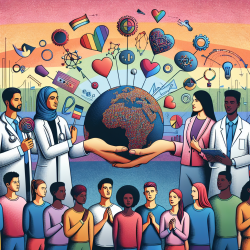Introduction: The Benevolence Narrative in Global Health
In the realm of global health, practitioners often embark on their missions with the best of intentions, driven by a desire to improve health outcomes across diverse populations. However, the research article "From reflexivity to collectivity: Challenging the benevolence narrative in global health" by Lori Hanson urges us to reconsider these intentions. The paper calls for a shift from individual reflexivity to a collective understanding of the systems and structures that underpin global health inequities.
Understanding Reflexivity and Its Limitations
Reflexivity, the practice of reflecting on one's own biases and assumptions, is a common approach in global health education. While it encourages personal growth and awareness, the research suggests that it may not be sufficient to address the systemic issues that perpetuate health inequities. Reflexivity often focuses on individual transformation rather than collective action, leaving the larger structural injustices unchallenged.
From Reflexivity to Collectivity
Hanson's research advocates for a shift towards a collective approach that examines the socio-political and economic systems influencing global health. This involves acknowledging the interconnectedness of high-income countries (HICs) and low- and middle-income countries (LMICs), and understanding how these relationships contribute to global health disparities.
Practitioners are encouraged to move beyond personal reflection and engage in collective action that addresses the root causes of health inequities. This means critically analyzing the power dynamics and historical contexts that shape global health practices.
Implementing a Collective Approach in Practice
For practitioners in the field of speech-language pathology, particularly those involved in online therapy services like TinyEYE, this shift towards collectivity can be implemented in several ways:
- Collaborative Learning: Engage in interdisciplinary collaborations that bring together diverse perspectives and expertise to address complex health issues.
- Community Engagement: Work closely with local communities to understand their unique needs and empower them to take an active role in shaping health interventions.
- Advocacy and Policy Change: Advocate for policies that promote health equity and challenge the systems that perpetuate disparities.
- Continual Education: Stay informed about the socio-political contexts affecting global health and integrate this knowledge into practice.
Encouraging Further Research
Hanson's research highlights the importance of moving beyond the benevolence narrative and calls for further exploration of the collective approaches in global health. Practitioners are encouraged to delve deeper into the systemic issues affecting health outcomes and contribute to the growing body of research in this area.
Conclusion: A Call to Action
As practitioners, it is crucial to recognize that good intentions alone are not enough to create meaningful change in global health. By embracing a collective approach, we can work towards a more equitable and just health system that addresses the root causes of disparities. This shift requires a commitment to understanding the complex systems at play and taking collective action to dismantle them.
To read the original research paper, please follow this link: From reflexivity to collectivity: Challenging the benevolence narrative in global health.










